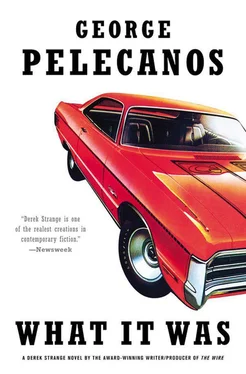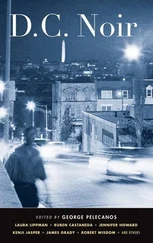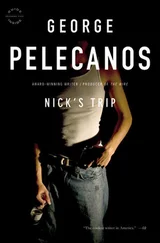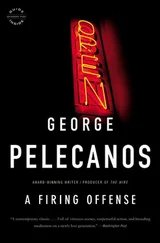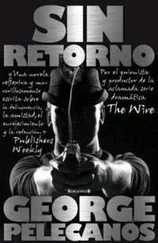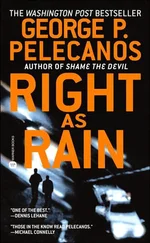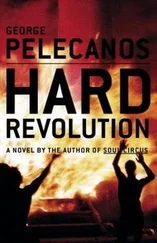George Pelecanos - What It Was
Здесь есть возможность читать онлайн «George Pelecanos - What It Was» весь текст электронной книги совершенно бесплатно (целиком полную версию без сокращений). В некоторых случаях можно слушать аудио, скачать через торрент в формате fb2 и присутствует краткое содержание. Жанр: Криминальный детектив, на английском языке. Описание произведения, (предисловие) а так же отзывы посетителей доступны на портале библиотеки ЛибКат.
- Название:What It Was
- Автор:
- Жанр:
- Год:неизвестен
- ISBN:нет данных
- Рейтинг книги:5 / 5. Голосов: 1
-
Избранное:Добавить в избранное
- Отзывы:
-
Ваша оценка:
- 100
- 1
- 2
- 3
- 4
- 5
What It Was: краткое содержание, описание и аннотация
Предлагаем к чтению аннотацию, описание, краткое содержание или предисловие (зависит от того, что написал сам автор книги «What It Was»). Если вы не нашли необходимую информацию о книге — напишите в комментариях, мы постараемся отыскать её.
What It Was — читать онлайн бесплатно полную книгу (весь текст) целиком
Ниже представлен текст книги, разбитый по страницам. Система сохранения места последней прочитанной страницы, позволяет с удобством читать онлайн бесплатно книгу «What It Was», без необходимости каждый раз заново искать на чём Вы остановились. Поставьте закладку, и сможете в любой момент перейти на страницу, на которой закончили чтение.
Интервал:
Закладка:
George Pelecanos
What It Was
INTRO
"Johnnie Walker ,”said Derek Strange. “Rocks.”
“Red or Black?” said the bdthartender. His name was Leonides Vazoulis, but folks on Georgia Avenue called him Leo. The short version was arranged horizontally, in neon, on the sign outside the bar.
“Make it the Black.”
“How about you, patrioti? ” said Leo, thick and bald, pointing to a fellow Greek who sat beside Strange. “Heineken?”
The Greek was middle-aged, thin, solidly built, with short hair salted gray. He wore 501s and a faded black T-shirt from the Harley store in Key West. On his feet were black high-top Chucks.
“Yeah,” said Nick Stefanos. “And put a Knob Creek next to it. Neat.”
Strange settled in, shifting his broad shoulders beneath his black leather blazer. His closely cropped hair was shaped up and correct. A Vandyke beard, straight silver against dark skin, framed his mouth. “Thought you were a Grand-Dad man.”
“You moved up the shelf. So can I.”
“I stopped with the Red when I turned sixty. If I’m gonna drink, I’m gonna enjoy every sip.”
Leo served them. They tapped glasses and drank without comment. The silence was pleasant in the way that it can be between men. Plus, Bettye LaVette was singing “Your Turn to Cry” from the juke. Strange and Stefanos were showing respect.
When the song was done, Stefanos crossed the empty room and stopped at the jukebox, which was stocked with soul rarities, funk, and R amp;B singles. Strange wondered what Stefanos, a rock and punk man, would choose. Stefanos punched in some buttons and moved toward the head as a song began to play. Through the plate glass fronting Leo’s, Strange watched a slanting downpour hit the street.
Boy went for theme music, thought Strange. And: It’s a good day to drink.
“ ‘I wanna go outside… in the rain,’ ” sang Strange, very softly.
It got him to thinking on the year that song had hit the charts. And, as thoughts of the past did more often of late, this drove his mind further into a cinematic recollection of that thrilling time.
“Nice choice,” said Strange, as Stefanos settled back onto his barstool.
“Call it.”
“The Dramatics. Nineteen seventy-two.”
“The summer Watergate broke.”
“You ask some people on this side of town to recollect that year, they wouldn’t think on Nixon. They’re gonna tell you that seventy-two was the summer that Red went off.”
“Red?”
“Some called him Red Fury.”
Stefanos hit his bourbon and waited for the rest.
“Robert Lee Jones was his given name,” swidn name,aid Strange. “He was known by Red from when he was a kid, on account of his light skin and the tint of his hair. Fury was the car his woman drove.”
“So?”
“You’re funny, man.”
Strange put up two fingers and made a swirling motion over the empties that were parked on the mahogany. Leo commenced to pouring their next round of drinks.
“You were, what, twenty-five in seventy-two?”
“That summer? I was twenty-six. But this ain’t about me.”
“We got all afternoon,” said Stefanos.
“Then let me tell it,” said Strange.
ONE
It was a Plymouth Fury, the GT Sport, a two-door 440 V-8 with hidden headlamps and a four-barrel carb. The color scheme was red over white, and its vanity plates read “Coco.” White interior made it a woman’s car. The bright finish and the personalized tags would render the vehicle easily identifiable around town, but Robert Lee Jones was unconcerned. To him it was important that he be remembered and that what he did got done with style.
Jones had bought the Fury for his woman, Coco Watkins, whose Christian name was Shirley. She was in the wheel bucket of the Plymouth, a Viceroy in her long-nailed hand resting atop the driver’s-side mirror. She and Jones were idling in park, facing south on 13th, between S and R, in Northwest. The in-dash radio was set on 1450. A Betty Wright number was playing.
Coco, so nicknamed because of the dark, buttery texture of her skin, was tall and strong of thigh. She wore red lipstick and violet eye shadow. When she stood she was finely postured. Her hair was big and it touched the headliner of the car. Jones thought of her as a stallion, if a stallion could be female. Surely they had a name for girl horses, but he couldn’t recall it. Aside from prison time, and a West Virginia childhood he barely recalled, he had rarely been outside the city.
“He’s in there,” said Jones, looking up to the face of the red-brick apartment house on the northeast corner of R. In a second-floor window, against a frayed curtain, was the silhouette of a small man.
“How you know it’s him?”
“That’s his itty-bitty shadow.”
“Could be a kid.”
“He tiny like one. But it’s him.”
“Maybe he got a girl up there.”
“Last time Bobby Odum had a girl, a black man was in the White House.”
“Wasn’t never no black president.”
“And he ain’t had no pussy since then.”
Coco’s shoulders shook as she issued a low laugh. Smoke dribbled through her painted lips.
“Leave it run,” said Jones.
He got out of the Plymouth and crossed the street in long strides. He, too, was tall. He wore patch-pocket jeans and two-tone brown Flagg Brothers stacks with three-inch heels and curlicue white stitching on the vamps. His loud-print rayon shirt, tails-out, had collars big as spears. His nose had been broken and left unset. He had very light skin, and his face and hard body were prominently freckled and moled. His ratty blowout was the color of rust and its unpicked, misshapen form gave him a general air of I-don’t-give-a-fuck. He was as he appeared to be.
Jones entered the building at 13th and R through a glass door set between nonfunctioning gas lanterns. He walked up a flight of stairs and stopped on the second-floor landing, which smelled of cigarettes and marijuana. In the air was the thump of bass coming from the stereo of one of the residents below, and he could feel it pulse through the wood floor. He came to the scarred door that he knew opened to the apartment of Bobby Odum, knocked on the door roughly, after a while heard a muddled voice say, “Who it is?” and he answered, “Red.”
The door opened. Odum, wearing plaid pants and a silk shirt open to expose a ladder of chest bones, stood a few steps back from the frame. The black stacks on his feet elevated him but somehow managed to make him look smaller. He was the size of Sammy Davis Jr. but lacked his talent. Plus, Sammy got all that play, and Odum got none. Even the whores, retailing their licorice on what was left of the 14th Street stroll, chuckled when he pulled out his money, cracking on him while they palmed his bread. Bring your twin brother, you got one, and strap him ’cross your ass so you don’t fall in. Ha ha ha. Almost made Jones sorry for Odum. Almost.
Odum forced a smile. “Red.”
“It is me.”
“What brings you here, brother?”
“My money does.” Jones entered the apartment and closed the door behind him.
Odum stood before him, flexing and unflexing his hands. Sweat had appeared on his dark, deeply lined forehead. His eyes told Jones that he was high.
“You want a drink, somethin?”
“I could.”
“Let me treat you to some Regal.”
“Pour it,” said Jones.
Odum went to a rolling cart displaying liquor and setups, and free-poured scotch into a clouded tumbler from a Chivas bottle. The bottle had been filled and refilled over the years with off-brands, its label faded to gray. It now held Scots Lion, the low-shelf brand from the Continental liquor shop on Vermont Avenue.
Читать дальшеИнтервал:
Закладка:
Похожие книги на «What It Was»
Представляем Вашему вниманию похожие книги на «What It Was» списком для выбора. Мы отобрали схожую по названию и смыслу литературу в надежде предоставить читателям больше вариантов отыскать новые, интересные, ещё непрочитанные произведения.
Обсуждение, отзывы о книге «What It Was» и просто собственные мнения читателей. Оставьте ваши комментарии, напишите, что Вы думаете о произведении, его смысле или главных героях. Укажите что конкретно понравилось, а что нет, и почему Вы так считаете.
